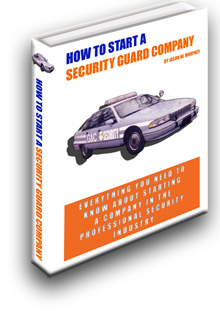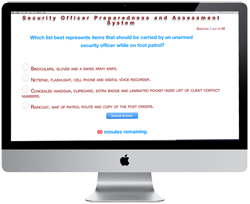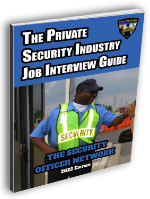 Practice Test
Training
Regulations
Security FAQs
Member Support
Sign In
Join
Practice Test
Training
Regulations
Security FAQs
Member Support
Sign In
Join

LAST EDIT July 7, 2023
Are PMCs the Future of American Security?
Listen to Content From This Article.
If you've been watching the news lately, you will have seen lots of talk about Private Military Contractors (PMCs).
Last week, we featured an emerging American security company that's fulfilling an essential niche in domestic safety: supplying heavily armed, expertly trained agents to inner-city neighborhoods plagued by crime.
Their plan? To secure government funding as they intervene in the gaps left by an ever-less responsive police force and an overburdened justice system.
So, a reasonable, thoughtful person could hardly be blamed for asking: Where is this all going? And, what is the difference between a PMC and an innovative private security firm providing high-end, well-equipped security services?
If state and local governments are going to try solving the criminal justice problem by pouring millions into the funding of security/military hybrid companies, could we be witnessing the rise of American PMCs operating on American soil?
How could this affect you? Do you, as a professional security officer, have a potential occupational future in a PMC?
So, if you've followed foreign policy news over the years, you are well aware of the federal government's use of PMC in other countries; but, with recent international news bringing PMCs back into the spotlight, here's an important question: will state and local governments begin to finance domestic PMCs, mirroring the federal government's longstanding practice of funding private military contractors abroad?
Could American PMCs actually experience success inside the US as many major American cities continue their descent into chaos?
If you delve into the world of criminal justice podcasts, you'll encounter sentiments expressed by public safety experts such as, "Yes, operating as law enforcement is frustrating, especially when the police can't provide necessary public safety services. Many are now tempted to console themselves with the notion that 'the voters asked for this, now they have to live with the consequences.'" This rationalization seems to allow them to potentially play it safe, keep a low profile, if possible, and collect a paycheck while trying to go home each day without either getting endangered or prosecuted.
When the police force begins to believe themselves to be ineffectual and justify it, the public will inevitably turn to private contractors and potentially call for government funding to subsidize those contractors so that everyone can benefit from their services.
This is from New Orleans, where earlier this year the city contracted with a private company to handle accident responses, a service traditionally provided by the police.
In Detroit, the private entity Detroit Threat Management has drawn national attention for its work on the streets and filling the void after the City of Detroit went bankrupt. This organization has pulled in national attention for its innovative approach to community safety and have reportedly successfully reduced crime in several communities with a unique proactive policy, focusing on prevention rather than reaction.
And as previously mentioned, in North Philadelphia, heavily armed private S.I.T.E. agents were credited by TIME Magazine for reducing crime at a local gas station. They are making the case for government funding in order to expand services to neighborhoods and one can't help but be inspired by his enthusiasm for driving crime from the streets of his hometown and reclaiming the city from the criminals who hold it in such a predicament right now.
As more private security entrepreneurs form business organizations to step up and fill the gap, expect that government funding will follow, and that public safety professionals, who would otherwise work as police, will instead make the same or better money working for the private companies.
Yes, they might still need to earn their police certifications. And, this will place pressure on governments to continue to facilitate these private agents in gaining police certification, but now, instead of hiring them directly, governments will outsource this to a middleman, a private security contractor, to deploy these officers on the streets. In fact, many private security personnel with police certification might never work directly for a police department.
Is this good or bad?
For entrepreneurs, it's certainly an opportunity. Those with a dash of American entrepreneurial spirit will view this as a phenomenal opportunity to both address a critical societal issue and build a valuable asset: their own private security firm.
For private professionals? Yes! As governments lessen restrictions on advanced certifications, such as police certifications, you won't need to be employed by a police department to become a law enforcement officer. You'll have more freedom and flexibility, with the ability to transition from executive protection to more relaxing preventative patrolling and intervention, instead of chasing calls and navigating law enforcement politics. The future is very bright for those who want to make a living in the security industry as a true security professional whose services will always be in demand.
For society? Well, these implications are more complex. We might just be discovering that a publicly overseen police department, that's accountable to an elected board of citizens, and operating according to a standardized system of professional conduct that's been improved and honed through many years of upwardly evolving ethics and policies, is a luxury of: firstly, a virtuous society, and secondly, an intelligent one. As societal norms have shifted and lowered the expectation on what is virtuous, and as the overall capacity of much of the population to understand nuance and provide intellectual analysis to the complex, multi-faceted outcomes of policing policy within a non-virtuous society, has been lowered, we have now, at least in the big cities, started to lose that luxury.
Here's the concern:
Should the public safety of the future become dominated by large PMC/security corporations, with limited accountability, then we will be at great risk. We can look at what recently occurred in Russia, and the role played by the CEO of their leading PMC, for just a brief example of one possible outcome and threat to governmental norms.
But if a wide array of smaller, ethical entrepreneurs of non-public corporations provides these services, then there is some hope. The market will naturally force these companies to maintain accountability to their diverse array of clients and provide an actual solution: i.e., innovative, well-designed public safety and security services to those who would otherwise not be able to afford it.
Thus, the government must tread carefully in regulating this space. As the author of "How to Start a Security Guard Company," I state that the security industry, as it's currently constituted, presents an excellent opportunity for startup companies due to its low barriers to entry. Even you, even if you are currently an unarmed security guard, can gather the required startup capital, given how little is needed. This is crucial because it allows numerous competitors to serve the community and challenge big corporations.
These small security entrepreneurs will be what holds the big corporations accountable in the impending Orwellian future. Without them, we might find ourselves living in Robocop's Detroit.
The big security corporation will have the means to influence election outcomes and seize control of government mechanisms.
If this happens, we will face two issues: the ever-more hamstrung police, who lack the incentive to do their jobs effectively, and thus the motivation to provide public safety as it was previously envisioned, and the overfunded private corporations, which will have the ability to participate in regulatory capture and manipulate all levels of government, making it virtually impossible to hold them accountable. The next thing you know, they resemble Russia's Wagner Corporation, so powerful that they threaten to topple the government.
So, if you are a professional security officer, if you haven't already, it may be time to start planning for the day when you will join the security ecosystem, serve your community and make a difference for everyone's benefit—with your own entrepreneurial endeavor. That day will likely be sooner rather than later.
What do you think? Once massive government funding kicks in, will security/PMC hybrids emerge into full-fledged PMCs on the streets of America? Will they be accountable to the people, their clients? Or will they grow up to be the cold, corporate monsters envisioned in Robocop? Would you work for one of these companies?
Let us know in the comments.
If you are an aspiring security professional, then you should join us at TheSecurityOfficerNetwork.com. It's the place to build your security resume and get your security network membership to impress your future clients and employers.
In the next article, we are going to be taking on a big question: is it acceptable for security officers to use AI when writing their incident reports? You won't want to miss our take. So, like and subscribe so that you can support the network for the YouTube algorithm and stay informed and up-to-date with the latest in the private security community.
That's it for now. We will see you next time. Stay safe!
Are you ready to start thinking about starting your own security company? Check out this 140 page ebook from The Security Officer Network entitled "How to Start A Security Guard Company". Get your PDF copy while it is still free! Or, order the paperback from Amazon.
How Much Does it Cost to Start a Security Guard Company - The initial investment that should be set aside before start a private security agency. Click to Read
How Much Can a New Security Agency Charge? - The new security agency's pricing strategy. Click to Read
What are the Components of the Security Guard Company Business Plan - The necessary elements of the Security Guard Company's business plan. Click to Read
How to Lower the Cost of the Securty Guard Company's Insurance Premiums - Methods for cutting the cost of insurance and undercutting the price model of the big security companies. Click to Read
How Much Should a Company Charge for Security Patrol? - Methods for charging for patrol route services. Click to Read

SecurityOfficerHQ.com is the exclusive provider of this free 57 page PDF guide. It features just about everything you need to know before taking the exam and includes The Professional Security Officer eCourse. You may get your copy for free right now only at SecurityOfficerHQ.com! Submit your name and email to receive your copy via email or click here to learn more about this guide.

SecurityOfficerHQ.com is the exclusive provider of this free 140 page PDF ebook. Less-comprehensive versions sell for $24, but, for the time being, you may get your copy for free right now only at SecurityOfficerHQ.com! Submit your name and email to receive your copy via email or click here to learn more about the book.

The forty question, free practice exam will test your unarmed security knowledge. It's the perfect test prep for those who must sit an exam before getting licensing.

This free job interview guide is the security officer's must-have resource. Get yours here.
© 2012 - 2026 The Security Officer Network
A Product of the 1918 Media Limited Liability Company
Addr: Thirty North Gould Street 2288
Sheridan, Wyoming 82801
Phone: (307) 461-6079
Red Hirundo Rustica Custom CMS and Testing Engine
Disclosures | Privacy | 307.461.6079